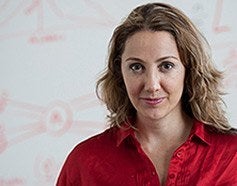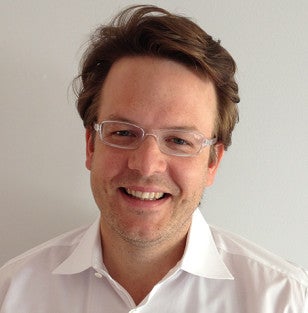For immediate release: Tuesday, May 19, 2015
Boston, MA ─ The Howard Hughes Medical Institute (HHMI) announced today that Harvard T.H. Chan School of Public Health researchers Tobias Walther and Pardis Sabeti are among 26 new HHMI investigators. HHMI will provide each investigator with his or her full salary, benefits, and a research budget over their initial five-year appointment, which is expected to begin in September 2015. Walther is professor of genetics and complex diseases at Harvard Chan School, professor of cell biology at Harvard Medical School (HMS), and an associate member of the Broad Institute of MIT and Harvard. Sabeti is an associate professor in the Department of Immunology and Infectious Diseases at Harvard Chan School, senior associate member at the Broad Institute, and an associate professor at the Center for Systems Biology in Harvard’s Department of Organismic and Evolutionary Biology.
The new HHMI investigators were selected for their individual scientific excellence from a group of 894 eligible applicants. Mid-career researchers with 5 to 15 years of experience as faculty members at more than 200 institutions were eligible to apply. HHMI investigators have the freedom to explore and, if necessary, to change direction in their research. Moreover, they have support to follow their ideas through to fruition — even if that process takes many years.
“Scientific discovery requires original thinking and creativity,” said HHMI President Robert Tjian. “Every scientist selected has demonstrated these qualities. One of the most important things we can do at HHMI is to continue to support and encourage the best discovery research. We don’t know this for certain, but the ideas that emerge from these labs might one day change the world, and it’s our privilege to help make that happen.”
Here are Walther and Sabeti’s profiles from HHMI’s announcement:
Tobias Walther
When the little balls of fat that float in our cells grow and accumulate excessively, they can cause a variety of health problems, including obesity, diabetes, and heart disease. But these lipid droplets play a vital role in cells: storing energy as well as the materials needed to build and maintain biological membranes. Tobias Walther wants to understand the molecular mechanisms behind lipid storage in cells. With colleague Robert Farese, he identified more than 200 genes that regulate lipid storage. He discovered that there are two classes of lipid droplets: small, static droplets and larger droplets that expand as needed. Walther showed how enzymes involved in synthesis of triglycerides (one type of lipid stored in the droplets) locate and engage with the expanding droplets to build new triglycerides. His team also studies how membrane lipids not stored in droplets are kept in balance inside cells. Ultimately, Walther aims to uncover the biochemical and physical principles that govern lipid balance and storage and to determine how alterations in lipid stores affect physiology and disease.
Pardis Sabeti

Computational geneticist Pardis Sabeti uses the evolutionary record embedded in the human genome to guide her to a new understanding of disease. Her lab’s computational methods for detecting recently evolved traits have uncovered genetic adaptations that altered humans’ malaria resistance, hair and sweat development, and immune responses to bacteria. When her analyses led her to a human gene associated with increased risk of infection by Lassa virus, a devastating pathogen that kills thousands each year in West Africa, she and her colleagues developed a research program for biosafety level-4 (BL-4) viruses in rural parts of Nigeria and Sierra Leone to study the virus and its role in human evolution. In the weeks following the 2014 outbreak of Ebola, Sabeti’s team used the tools it had developed for studying BL-4 viruses to rapidly sequence and analyze 99 viral genomes from infected patients in Sierra Leone. These data, which confirmed that the virus was spreading between humans, also revealed how the virus was mutating. The team’s results informed strategies for diagnosing the disease and curbing its spread. Sabeti’s research team continues to examine the genomes of humans and deadly viruses for clues to how each has influenced the other’s evolution. Her approach could transform future response to infectious disease outbreaks.
Visit the Harvard Chan website for the latest news, press releases, and multimedia offerings.
For more information:
Todd Datz
tdatz@hsph.harvard.edu
617.432.8413
###
Harvard T.H. Chan School of Public Health brings together dedicated experts from many disciplines to educate new generations of global health leaders and produce powerful ideas that improve the lives and health of people everywhere. As a community of leading scientists, educators, and students, we work together to take innovative ideas from the laboratory to people’s lives—not only making scientific breakthroughs, but also working to change individual behaviors, public policies, and health care practices. Each year, more than 400 faculty members at Harvard Chan teach 1,000-plus full-time students from around the world and train thousands more through online and executive education courses. Founded in 1913 as the Harvard-MIT School of Health Officers, the School is recognized as America’s oldest professional training program in public health.
The Howard Hughes Medical Institute is committed to advancing basic biomedical research and science education for the benefit of humanity. Its scientists, located across the country and around the world, have made important discoveries that advance our fundamental understanding of biology. In a complementary program at HHMI’s Janelia Research Campus in Ashburn, Virginia, leading scientists are pursuing long-term, high-risk, high-reward research in a campus designed to bring together researchers from disparate disciplines. The Institute also aims to transform science education into a creative, interdisciplinary endeavor that reflects the excitement of real research. For more information, visit www.hhmi.org.
